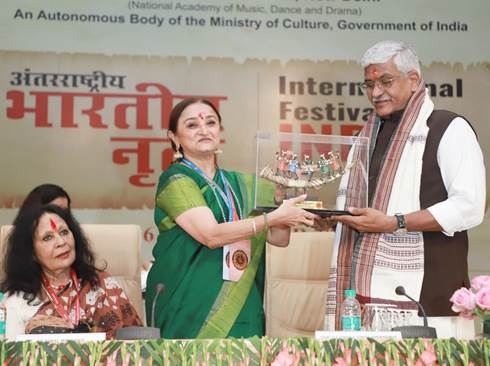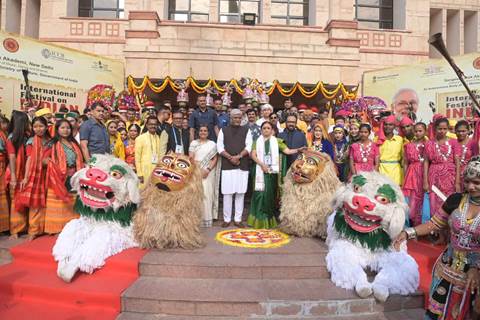Ministry of Culture
“Music and dance are languages that transcend borders and are universally understood": Prime Minister Shri Narendra Modi
“Engaging youth in such festivals helps them stay connected to their roots and strengthens their role in nation-building”: Prime Minister Shri Narendra Modi
Union Minister of Culture and Tourism Shri Gajendra Singh Shekhawat Inaugurates International Festival on Indian Dance
Posted On:
16 OCT 2024 6:33PM by PIB Delhi
The Sangeet Natak Akademi hosted its first-ever International Festival on Indian Dance, featuring artists from around the world. Prime Minister Narendra Modi shared a special message for the festival, highlighting the significance of dance in India’s cultural heritage and its role in engaging youth with the nation’s traditions.
The six-day festival was inaugurated by Shri Gajendra Singh Shekhawat, Minister of Culture and Tourism, at the A.P. Shinde Symposium Hall, NASC Complex, Pusa, New Delhi. The event brings together artists, scholars, and students to celebrate and explore the diversity and richness of Indian dance forms.

In his message, Prime Minister Shri Narendra Modi expressed gratitude to the Sangeet Natak Akademi and the Ministry of Culture, stating, “This is a historic moment and a memorable occasion for all of us. The participation of artists from various nations helps in cultural exchange. Music and dance are languages that transcend borders and are universally understood." PM Modi highlighted the significance of dance for the younger generation, calling it an integral part of India’s cultural identity. He added, “The earliest scriptures dedicated to performing arts were written by Bharat Muni in India. Carrying forward this legacy is both a source of pride and a responsibility.” He emphasized that engaging youth in such festivals helps them stay connected to their roots and strengthens their role in nation-building.
Speaking on the occasion, Minister of Culture and Tourism, Shri Gajendra Singh Shekhawat elaborates that, “This festival celebrates the grand tradition of Indian dance, bringing together artists, scholars, and practitioners from across the globe to honor our cultural heritage. Like the ever-flowing Ganga, these traditions thrive through the dedication of generations, connecting us to a deeper unity amidst diversity. He said that I come from the deserts of Rajasthan, where art flourished even in scarcity. I have witnessed how music and dance bring joy and meaning to life, just as Mirabai’s devotional songs did. In today’s turbulent world, where geopolitical instability and moral decline are prevalent, India offers a cultural compass through its ancient wisdom, arts, and values. As global acceptance of our practices—from yoga to Ayurveda—grows, it is our responsibility to carry this legacy forward. This festival serves as a platform to exchange ideas, like the churning of the ocean that produced nectar, empowering India and the world with inspiration and direction for future generations."

Ms. Uma Nanduri, Joint Secretary of the Ministry of Culture, extended her heartfelt congratulations to the Sangeet Natak Akademi for organizing this incredible event and bringing together so many young participants. At the Ministry of Culture, we are working towards the welfare and equality of the cultural, artistic, and dance communities. We are committed to achieving significant progress in the years ahead under the leadership of our culture minister.”
Dr. Sonal Mansingh addressed the media, stating, “Hard movement has been replenished again and again by dance. The idea of Nataraj attains greater significance in our times. When people are talking about scientific advancement, artificial intelligence, and more, I fear artificial intelligence might one day lead to a scenario where Sonal Mansingh dances with the help of AI. We have to step ahead while accumulating all these things with propriety, balance, and an understanding of creativity.”
Dr. Sandhya Purecha, Chairperson, Sangeet Natak Akademi, stated, that she had the good fortune to experience a wide array of performing arts across India. It was almost instinctive that I envisioned uniting all our rich and diverse dance traditions under one roof for a nuanced exploration of Indian dance in its many dimensions. As Prime Minister stated, preserving and carrying forward such a rich legacy is a source of pride as well as a responsibility.”
About The festival:
The International Festival on Indian Dance, organized by the Sangeet Natak Akademi, is bringing together artists, scholars, dance critics, and performers from around the world. The festival kicked off today. It will include thirty seminars exploring various themes, including the historical and contemporary evolution of Indian dance, dance education, research methodologies, and the impact of artificial intelligence on the arts. Discussions will also cover corporate social responsibility (CSR) funding and sustainable livelihoods for performers.
Each evening, the Kamani Auditorium will feature cultural performances showcasing the talents of renowned artists, including Dr. Sonal Mansingh and Ramli Ibrahim, as well as solo and group acts from India and abroad. Additionally, two exhibitions, opening today, will be featured: one at the Lalit Kala Akademi highlighting the history of the Sangeet Natak Akademi and another at the A.P. Shinde Symposium Hall showcasing the achievements of participating artists. The festival aims to foster discussions on sustainable careers in the arts and promote institutional support for Indian dance, creating a platform for collaboration and cultural exchange.
About Sangeet Natak Akademi:
About Sangeet Natak Akademi: Sangeet Natak Akademi- India’s national academy of music, dance and drama – is the first national academy of the arts set up by the Republic of India. It was created by a resolution of the (then) Ministry of Education, Government of India, dated 31 May 1952.
The Akademi became functional the following year, with the appointment of its first Chairman, Dr P.V. Rajamannar, and the formation of its all-India council of representatives, the General Council. The first President of India, Dr Rajendra Prasad, inaugurated it on 28 January 1953 at a special function held in the Parliament House. Since its inception, the Akademi has been functioning as the apex body in the field of Performing arts in the country, preserving and promoting the vast intangible heritage of India’s diverse culture expressed in forms of music, dance and drama. In furtherance of its objectives, the Akademi coordinates and collaborates with Government and arts academies of different States and Union Territories of the Union of India, as also with major cultural institutions in the country.
The Akademi establishes and looks after institutions and projects of national importance in the field of the performing arts. As the apex body specializing in the Performing arts, the Akademi also renders advice and assistance to the Government of India in the task of formulating and implementing policies and programmes in the field of the performing arts. Additionally, the Akademi carries a part of the responsibilities of the state for fostering cultural contacts between various regions in India, and between India and the world.
***
BY/SKT
(Release ID: 2065508)
Visitor Counter : 1012